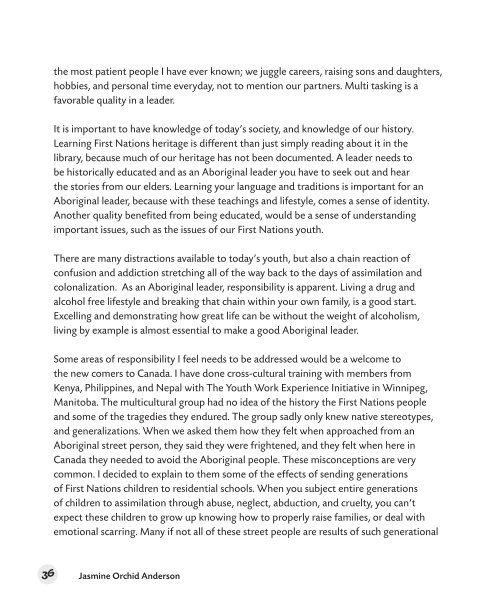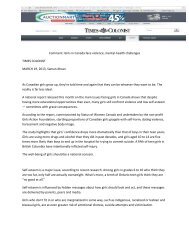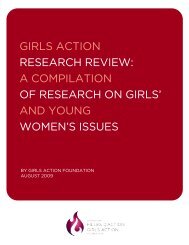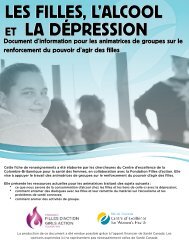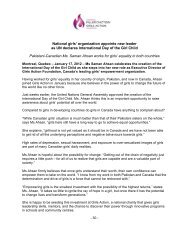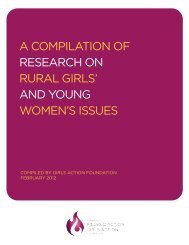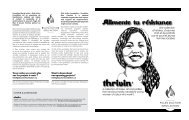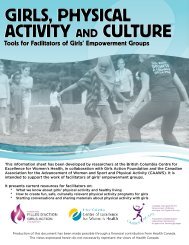Aboriginal - Girls Action Foundation
Aboriginal - Girls Action Foundation
Aboriginal - Girls Action Foundation
You also want an ePaper? Increase the reach of your titles
YUMPU automatically turns print PDFs into web optimized ePapers that Google loves.
the most patient people I have ever known; we juggle careers, raising sons and daughters,<br />
hobbies, and personal time everyday, not to mention our partners. Multi tasking is a<br />
favorable quality in a leader.<br />
It is important to have knowledge of today’s society, and knowledge of our history.<br />
Learning First Nations heritage is different than just simply reading about it in the<br />
library, because much of our heritage has not been documented. A leader needs to<br />
be historically educated and as an <strong>Aboriginal</strong> leader you have to seek out and hear<br />
the stories from our elders. Learning your language and traditions is important for an<br />
<strong>Aboriginal</strong> leader, because with these teachings and lifestyle, comes a sense of identity.<br />
Another quality benefited from being educated, would be a sense of understanding<br />
important issues, such as the issues of our First Nations youth.<br />
There are many distractions available to today’s youth, but also a chain reaction of<br />
confusion and addiction stretching all of the way back to the days of assimilation and<br />
colonalization. As an <strong>Aboriginal</strong> leader, responsibility is apparent. Living a drug and<br />
alcohol free lifestyle and breaking that chain within your own family, is a good start.<br />
Excelling and demonstrating how great life can be without the weight of alcoholism,<br />
living by example is almost essential to make a good <strong>Aboriginal</strong> leader.<br />
Some areas of responsibility I feel needs to be addressed would be a welcome to<br />
the new comers to Canada. I have done cross-cultural training with members from<br />
Kenya, Philippines, and Nepal with The Youth Work Experience Initiative in Winnipeg,<br />
Manitoba. The multicultural group had no idea of the history the First Nations people<br />
and some of the tragedies they endured. The group sadly only knew native stereotypes,<br />
and generalizations. When we asked them how they felt when approached from an<br />
<strong>Aboriginal</strong> street person, they said they were frightened, and they felt when here in<br />
Canada they needed to avoid the <strong>Aboriginal</strong> people. These misconceptions are very<br />
common. I decided to explain to them some of the effects of sending generations<br />
of First Nations children to residential schools. When you subject entire generations<br />
of children to assimilation through abuse, neglect, abduction, and cruelty, you can’t<br />
expect these children to grow up knowing how to properly raise families, or deal with<br />
emotional scarring. Many if not all of these street people are results of such generational<br />
36 Jasmine Orchid Anderson


